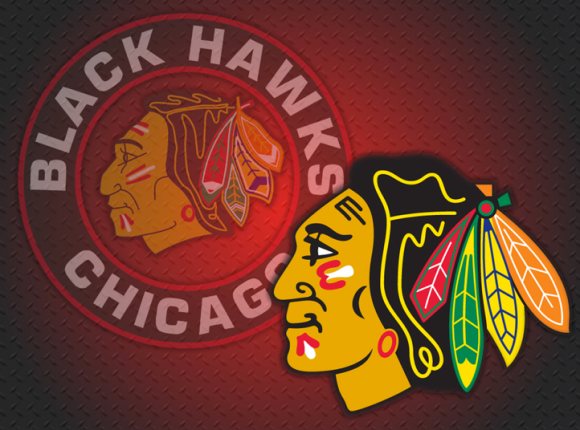Saw this piece over at the blog, Racialicious and since I have written on this issue regarding the Washington Redskins I thought it brought a fresh perspective to the matter as relates to Native American macots in general:
As a white youth growing up playing ice hockey in the 1960s, in a Chicago suburb, I fell in love with the Chicago Blackhawks. I watched Hawks games on T.V., and during the intermissions between the periods, I retired to the kitchen (and its smooth, slick tile floor) to shoot my plastic puck at the cabinets. For the kitchen shootouts, I channeled my all-time favorite, the always-helmeted Stan Mikita, or on occasion, Bobby Hull. Born just after the team’s 1961 Stanley Cup championship, I anticipated – without too much patience – the next championship, and suffered through the team’s two failed Stanley Cup appearances in the early seventies.
But between those years and the team’s next championships in 2010 and now 2013, my Native American friends encouraged me to reflect more deeply on the way symbols like the team’s own “Chief Black Hawk” distorted their identities, particularly in the imaginations of white Americans. Ultimately, in graduate school at the University of Illinois-Champaign, I critiqued my school’s infamous mascot, Chief Illiniwek, and my friend Richard King and I went on to edit Team Spirits: The Native American Mascot Controversy, a 2001 collection of essays giving voice to how Native Americans feel about many of these manifestations of the power of non-Indian, mostly white institutions and people to (re)represent, (re)name, and (re)contextualize Native peoples for white purposes.
In his foreword for the book, renowned scholar Vine Deloria Jr. of the Standing Rock Sioux Nation wrote:
With diehard refusal to change the names and logos of sports teams we always hear the justification that the name is being used to ‘honor’ us. This tortured reasoning makes its proponents look absurd. Obviously if garish costumes, demeaning cheers, and crude logos are the essence of honor, then the various sports halls of fame need to perform drastic surgery on the busts and plaques of their honorees. The excuse, being lame, must conceal something more profound, which cannot or will not be articulated by those people ‘honoring’ us.
Maybe the most vivid contemporary example, the Washington R*dskins, is addressed by Suzan Shown Harjo of the Cheyenne and Holdulgee Muscogee tribes, the plaintiff in the case against the franchise. The plaintiffs’ legal strategy turns on U.S. trademark law and its prohibition against trademarking racial epitaphs, and as such, they seek merely to deny the Washington R*dskins team the right to own the trademark of own name and image. Harjo, writing in Team Spirits, acknowledges that the case may take a long while to play out in federal court, but she asserts:
Three things are certain at this time … The Native American position is rock solid and will not change. The circle of non-Native supporter is wider, stronger, and more diverse. The time has come to consign “Redskins” to the history books and museums.”
What do you think?
Increasingly uncomfortable rooting for a team relying on Native American imagery to popularize its identity, my passion for the team has now dimmed. Somewhat ambivalent still, I was jealous of the team’s many supporters reveling in and celebrating the 2010 championship. And as I share this with you, Patrick Kane and Jonathon Toews have just led the Hawks yet again to a Stanley Cup championship. Persuaded by years of inquiry into the problematic history of how athletic teams have too often resorted to Native American imagery to convey their identities, I will let me many friends who are Blackhawk fans celebrate without me.
Man I wish people would understand the power of these names and the inherent insult built in considering how real Native Americans were treated in American history. But alas, many will see this as criticism of their teams and will ignore it. But it is about so much more than sports.
Read the rest of the very thought-provoking essay here.
